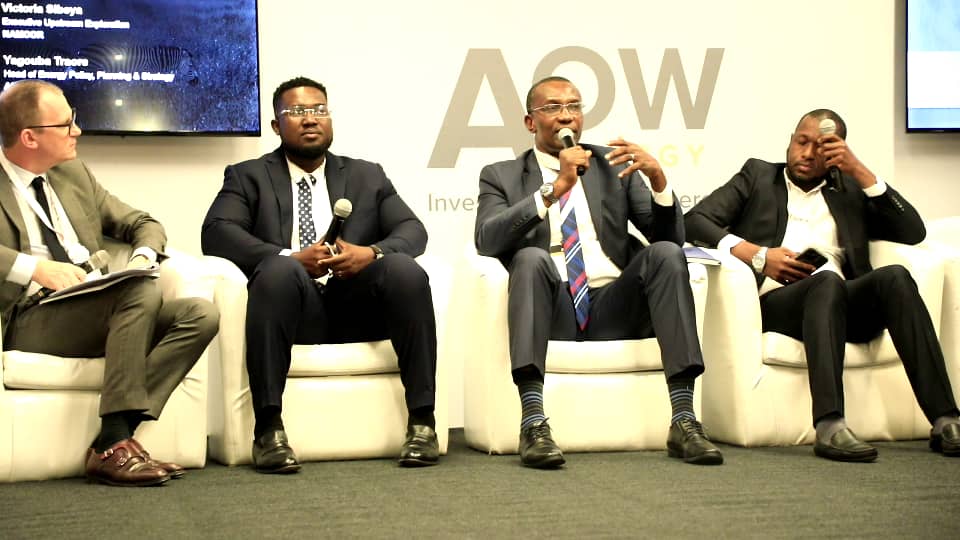Cross-border collaboration, data accuracy, key to unlock Africa’s natural resources-Okwuosa
By Emmanuella Anokam,Gami Tadanyigbe
Copyright sharpedgenews

By Emmanuella Anokam
Dr Emeka Okwuosa, Chairman and Group CEO, Oilserv Group, has reiterated the need for cross-border collaboration and data accuracy as tools to unlocking Africa’s prosperity in natural resources.
Okwuosa spoke at a Local Content Plenary Session, co-hosted by the Nigerian Content Development and Monitoring Board (NCDMB) and the Ghana Petroleum Commission, at the just concluded African Oil Week (AOW) in Accra, Ghana.
The session has its theme as “Cross-border Projects and Knowledge Exchange.”
Okwuosa, in a statement on Tuesday in Abuja, while emphasising on continental synergy, opted for visa restriction relaxation for professionals across African borders, to promote personnel exchange, skills transfer and rapid project mobilisation.
Okwuosa, represented by Mr Chuka Eze, Managing Director, Frazimex Engineering Ltd. (Oilserv subsidiary), said that Africa’s true prosperity relied on its ability to work as one, share expertise, infrastructure and ambition to drive collective growth.”
He said that continental synergy was not just important but indispensable, allowing nations to tap into existing expertise and proven technical capabilities rather than “reinvent the wheel.”
“Given the operational complexities of the upstream sector, there is a need for African countries to learn from those who have already mastered the process, leveraging their knowledge to extract resources efficiently and sustainably.
“I am calling for unity and innovation, envisioning an Africa that harnesses its own resources, expertise and partnerships to power a brighter, self-defined energy future,” he said.
He highlighted the critical need for accurate and accessible data, noting that sound decisions and smart investments depend on reliable information that gives investors and policymakers the confidence to act boldly.
He said that NCDMB’s initiatives, such as the Nigerian Oil and Gas Opportunity Fair (NOGOF) and the Service Providers Qualification System were transparent platforms that could bridge information gaps and promote local content.
He added that Oilserv’s success story is emblematic of how deliberate capacity development and persistence can yield continental impact.
“What began with modest local contracts; ‘refurbishing of swimming pool,’ has matured into a three-decade journey that positions Oilserv as a trusted Engineering, Procurement and Construction (EPC) contractor across multiple African markets.
“Today, Oilserv operates across Nigeria, Benin, Ghana, Togo and Uganda, providing a model for how indigenous firms can scale technically and geographically. The significance of Oilserv’s footprint goes beyond company growth.
“Each project delivers direct economic value, infrastructure that raises domestic energy security, while generating secondary impacts: local jobs, skills transfer, supply-chain development and structured graduate training that links young engineers to large, complex projects.
“These outcomes embody the NCDMB’s mandate: transform local content into real competence and commercial opportunity,” he said.
He said Frazimex played the complementary technical role: engineering design and project definition that could make large projects buildable and bankable.
Two flagship projects discussed at the plenary illustrate the point, which are “the Obiafu–Obrikom–Oben (OB3) Gas Infrastructure, as Frazimex executed the engineering design for the pipeline and gas treatment complex.
This includes a 48-inch X 128km pipeline and a 2bscf/day treatment plant configured in four trains (each rated 500mscf).
He, however, disclosed that Oilserv executed procurement and construction, adding that the system was delivering substantive volumes of gas, above 300 million standard cubic feet (mscf).
“Also, the Ajaokuta–Kaduna–Kano (AKK) Pipeline (Segment 1), a 40-inch X 614km pipeline designed to route gas from Nigeria’s middle belt to the north, demonstrates Oilserv’s capacity to execute across “unimaginable terrains,” applying engineering solutions at scale.
“These projects indicate that Africa has the technical know-how to design and deliver world-scale energy infrastructure.
“There is need for business-friendly policies to solve continental problems and mobility frameworks to ease movement across borders, foster collaboration and accelerate the exchange of skills and technology,’’ he said. (NAN)(www.nannews.ng)



